What the Bible Says About Cannabis
Cannabis’ role in the Bible is debatable, but some scholars suggest that it played a significant role in several Bible stories.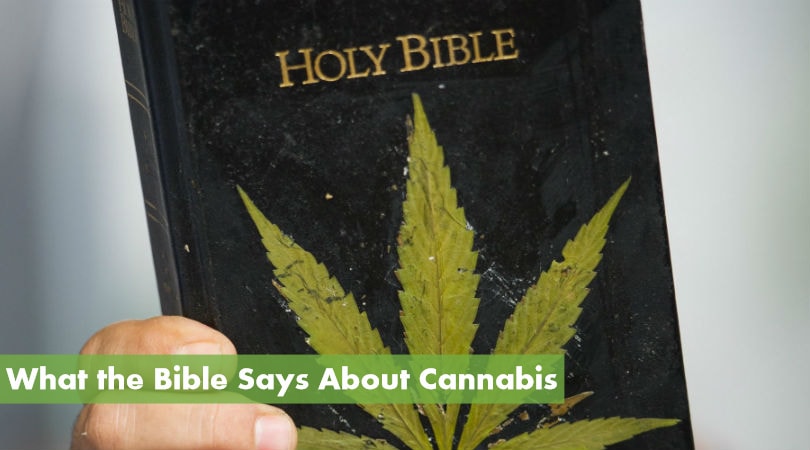 Is cannabis a dangerous, corrupting substance – or a healing gift from God Himself? These questions have driven scholars and laypeople alike to dig into the Bible in search of answers. In recent years, cannabis (alongside its derivative, cannabidiol – better known as CBD) has garnered significant attention for its astounding healing capabilities. Large numbers of people who had written marijuana off as a dangerous drug are re-evaluating their stance. Understandably, many religious people are reluctant to fully accept marijuana without confirmation that it won’t contradict the rules of their faith.
Is cannabis a dangerous, corrupting substance – or a healing gift from God Himself? These questions have driven scholars and laypeople alike to dig into the Bible in search of answers. In recent years, cannabis (alongside its derivative, cannabidiol – better known as CBD) has garnered significant attention for its astounding healing capabilities. Large numbers of people who had written marijuana off as a dangerous drug are re-evaluating their stance. Understandably, many religious people are reluctant to fully accept marijuana without confirmation that it won’t contradict the rules of their faith.
So, what does the Bible say about cannabis?
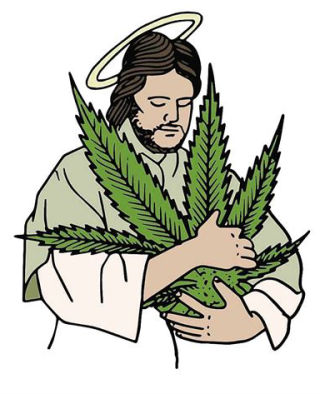
At first glance, it actually appears that cannabis is never mentioned in the Bible, as there are no specific references to it by name. However, many Biblical scholars agree that cannabis does appear quite a few times, in the Old and New Testaments, and has simply been mistranslated – possibly on purpose. These probable cannabis references in the Bible carry a sense of respect for the potent power of this plant. From the Holy oil of Moses to the healing miracles of Jesus, it’s possible that cannabis played a critically important role in the original versions of some of Jewish and Christian Scripture’s best-known stories.
Q: Is marijuana mentioned in the Bible?
A: Though cannabis by its proper name is never mentioned in the Bible, many Bible scholars believe that numerous references to a plant called calamus are actually mistranslations of cannabis. One of these references is to calamus/cannabis as a primary ingredient in a Holy oil recipe given directly to Moses by God.
Does the Bible approve of cannabis?
The Bible never outright condemns the use of cannabis. There were no laws against using cannabis in the Hebrew or Christian ancient texts. It’s highly likely that at the time the Bible was written, people in the Middle East were well-aware of the existence, usefulness, and potentially intoxicating factors of marijuana. In the original Hebrew Old Testament, the use of hemp, both as an incense for religious celebration and as an intoxicant was mentioned.
Many people interpret the words of Genesis 1:29 to imply that weed is inherently good and approved for human use since, like all plants, it was created for us by God. In this verse, God tells Adam that “Every plant yielding seed that is on the face of all the earth, and every tree with seed in its fruit, you shall have them for food.” There is some debate over the hard-and-fastness of this rule, considering that there are a number of earthly plants that are toxic to humans if consumed. Hemp seeds do make a tasty and nutritious addition to the human diet. But many are not convinced that this passage expresses approval for smoking weed.
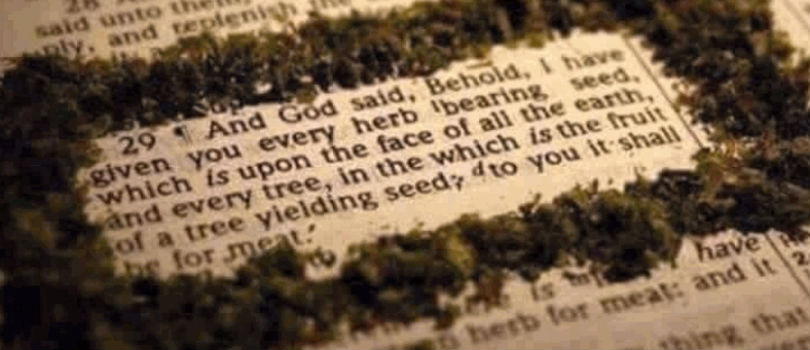
Genesis 1:29
Something interesting to ponder is the idea that marijuana truly was designed for humans, as a plant of healing and enlightenment. Human bodies come equipped with an “endocannabinoid system” that affects so many essential bodily functions, including movement, mood, memory, and sleep. Our bodies naturally produce cannabinoids – a type of chemical compound that’s also found abundantly in marijuana (THC and CBD are two well-known examples). We easily and effectively assimilate the cannabinoids in weed, and they have the amazing ability to help us “bridge the gap” if our own body is coming up short on cannabinoid production. Some believe this symbiosis is too perfect to be a coincidence.
Union for Reform Judaism’s current stance
The Union for Reform Judaism (URJ) passed a Resolution on the Medicinal Use of Marijuana in 2003. The URJ is calling for Federal legalization of weed in the United States for medicinal use, as well as to improve researchers’ access to it. The URJ argues that their tradition requires physicians to heal the sick, and cannabis appears to be a potent treatment. However, more research is needed on how to safely use it. Removing the Federal ban on marijuana would make this research far easier to accomplish and bring the healing potential of cannabis to many more people.
Cannabis in the Old Testament
Aside from Genesis 1:29, five other books of the Old Testament contain probable cannabis references.
The Song of Songs
In the Song of Songs, as King Solomon admires and poetically describes his new bride, he compares her qualities to a variety of desirable plants, fruits, and oils. In Song of Songs 4:14, fragrant calamus (believed to be a mistranslation of cannabis) is among these comparisons.
Isaiah
It’s been speculated that Isaiah 18:4-5 references the harvesting of the cannabis plant. In Isaiah 43:24, the people of Israel are chided for their hypocritical worship habits. It is mentioned that the Israelites have not procured “sweet cane” as an offering to God. This “sweet cane” is believed to reference the Holy anointing oil ingredient of the same name, which many researchers believe was cannabis.

Aside from Genesis 1:29, five other books of the Old Testament contain probable cannabis references.
Jeremiah
In Jeremiah 6:20, God expresses displeasure with the material sacrifices His followers have been offering to atone for their sins. “Incense from Sheba and the sweet cane from a far country” are specifically mentioned as unacceptable offerings in this context. It is believed that both the incense and sweet cane mentioned in this verse may have been cannabis.
Ezekiel
Ezekiel 34:29 speaks of a “plant of renown,” which some translations have interpreted to be a reference to hemp. However, there is some argument that this passage is actually talking about a fruitful land for planting, not a particular plant.
Exodus
The most notable cannabis references in the Old Testament are in the book of Exodus. Moses begins conversing with God after he goes to investigate a bush that he observes to be on fire, but not burning up (Exodus 3:2-5). God then instructs Moses to bring the Israelites out of Egypt, where they had been living in oppression. After Moses successfully accomplishes this feat, God continues to come to him with divine information and further instructions. However, it has been speculated that this communion took place under the influence of weed. God is even described throughout Exodus as making His earthly appearances in clouds of smoke.
In Exodus 19:9, God tells Moses, “I will come to you in a dense cloud so that the people will hear me speaking with you and will always put their trust in you.” Moses was instructed by God to set up an altar inside his tent for the sole purpose of burning incense (which may have been cannabis) in Exodus 30:1-9. When the cloud of smoke could be observed at the door, his followers would assemble outside the tent in prayer.

Moses begins conversing with God after he goes to investigate a bush that he observes to be on fire, but not burning up.
Was Moses’ Holy anointing oil cannabis-based?
After instructing Moses on how to set up his “tent of meeting,” God then directly gives Moses the recipe for a Holy anointing oil (Exodus 30:22-25). The oil was to be treated as highly sacred and only be used to consecrate priests or anoint items for use at Moses’ altar, transforming secular items (or people) into Holy ones. Later on, kings were given the authority to also use this Holy oil. Making or using this oil for any other purpose was strictly forbidden. It is believed by many that this oil contained a high concentration of cannabis.
In the Old Testament, a common (and rather ordinary) plant called calamus is credited as a primary ingredient in this Holy anointing oil. However, both the Hebrew and Aramaic translations of the Old Testament instead list this ingredient as “kaneh-bosm,” – which is cannabis. The literal translation of kaneh-bosm (which has also been written as q’aneh-bosm, kaneh, kannabus, kanabos, and kineboisin) is “aromatic reed” or “aromatic hemp.”
Many Biblical scholars, including etymologists at Jerusalem’s Hebrew University, have concluded that this reference to calamus was indeed a mistranslation of kaneh-bosm/cannabis. This error of translation first occurred in the oldest Greek translation of the Hebrew Bible, in the 3rd century B.C., and it was replicated in all subsequent translations.
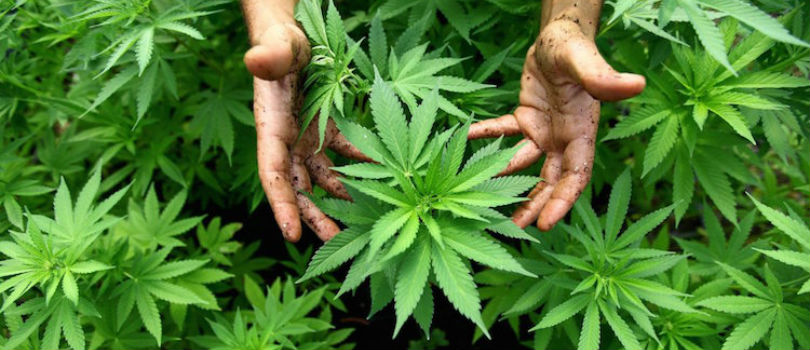
Many Biblical scholars have concluded that this reference to calamus was indeed a mistranslation of kaneh-bosm/cannabis.
What was in the recipe for Holy anointing oil?
The recipe for this Holy anointing oil is directly laid out in Exodus 30:22-23: “500 shekels of liquid myrrh, half as much of fragrant cinnamon, 250 shekels of kaneh-bosm (or “fragrant calamus”), 500 shekels of cassia, and a hind of olive oil.” Shekels were units of both money and weight in Biblical times. The exact measurement of a shekel has varied a bit over the years and from country to country, but its value typically sat between 7 and 17 grams, or approximately .40 ounces. This means that approximately 2.5 kilograms or 6 pounds of cannabis would have been infused into approximately 6.5 liters or just over 14 pounds of the olive oil base. The result would have been extremely potent!
This oil was applied topically to the skin of Holy men and would have undoubtedly altered their mental state, perhaps opening them up to the ability to communicate with God on an entirely different level than in simple prayer. Another argument that this oil was made with cannabis, not calamus, is that calamus at such a high concentration would have been toxic, capable of causing damage to the liver, kidneys, and heart. However, the same quantity of cannabis would not be toxic – though the psychoactive effects would have been incredibly strong!
Did Jesus use cannabis?
The New Testament offers many likely examples of Jesus Christ using this same Holy cannabis oil. It’s entirely possible that Jesus performed many of his miracles and healings with a little help from highly concentrated weed.
In the Bible, Jesus introduces Himself simply as “Jesus of Nazareth.” “Christ” was actually a title given by His disciples, taken from the Greek word Christos – a translation of the Hebrew and Aramaic Messiah, which means “anointed.”
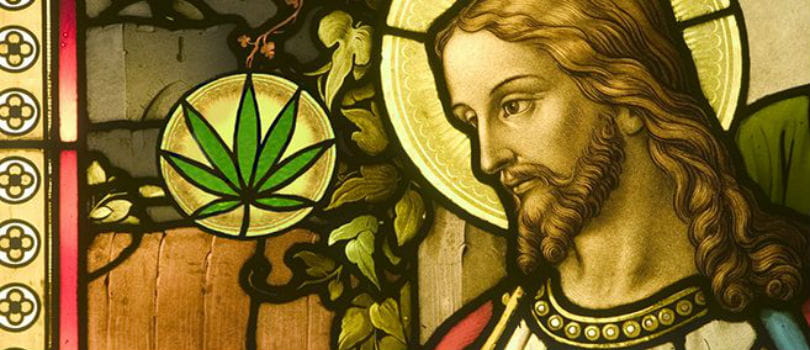
The New Testament offers many likely examples of Jesus Christ using this same Holy cannabis oil.
Jesus, however, did anoint common people with His healing oil. As described in Mark 6:13, “They cast out many devils and anointed with oil many that were sick and healed them.” Matthew 4:24 goes on to say: “News about Him spread all over Syria and people brought to Him all who were ill with various diseases, those suffering severe pain, the demon-possessed, those having seizures, and the paralyzed; and he healed them.”
The types of conditions that Jesus is credited with healing include:
- Severe and painful skin conditions, such as leprosy, dermatitis, eczema, and psoriasis.
- Muscle conditions such as rheumatism and multiple sclerosis – Jesus is referred to as “the straightener of the crooked limbs” in Acts of Thomas.
- Eye disease, such as glaucoma.
- Issues related to menstruation, such as dysmenorrhoea (painful menstruation), menorrhagia (abnormally heavy or prolonged bleeding), and uterine hemorrhage related to childbirth.
- Epilepsy, the symptoms of which would have likely been viewed as demonic possession in Biblical times.
Interestingly, all of these conditions have been shown in recent years to respond well to treatment with cannabis. If Jesus were applying highly concentrated cannabis oil to the skin of those suffering from these ailments, it makes sense that quick and dramatic improvements would be seen in their condition. It’s little wonder that Jesus would be hailed as a miracle worker by anyone observing these effects.
Q: Did Jesus use cannabis oil?
A: Some scholars believe that Jesus performed his healing miracles with cannabis oil. If He were using the highly concentrated Holy oil recipe given to Moses (in Exodus 30: 22-23), it’s likely that the ailments Jesus is credited with healing (including skin conditions, muscle conditions, and epilepsy) would have seen quick and dramatic improvements.
What do the skeptics say?
Not all scholars embrace the theory that Biblical references to calamus are merely mistranslations of cannabis. Lytton John Musselman, a professor of botany at Old Dominion University, insists that calamus has strong medicinal properties all on its own. He shares examples of its popularity in Sri Lanka, as well as among the Native Americans who once populated the northeastern United States. Musselman also defends calamus’s status as a healing plant, as it is used in Ayurvedic medicine.
Additionally, many people interpret the many Biblical warnings against getting drunk on alcohol (such as Ephesians 5:18: “Do not get drunk on wine, which leads to debauchery. Instead, be filled with the Spirit”) to naturally include intoxication by marijuana (or any other substance), though this is not explicitly stated anywhere in the Bible.
Q: What does the Bible say about using weed?
A: The Bible doesn’t outline explicit rules against using weed, though it could be argued that the verses warning against alcohol intoxication apply to any substance capable of producing an intoxicating effect.
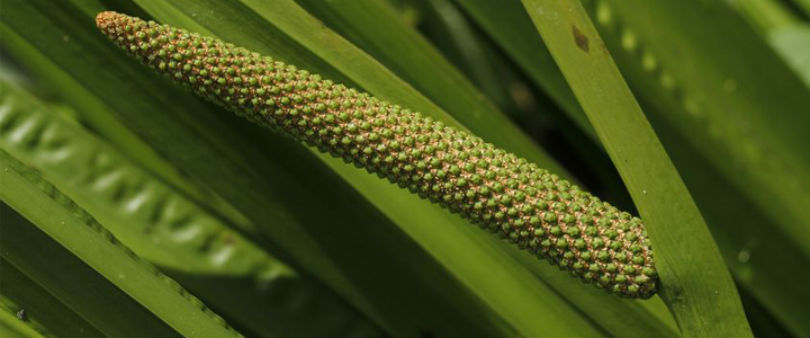
Lytton John Musselman, a professor of botany at Old Dominion University, insists that calamus has strong medicinal properties all on its own.
Was cannabis purposely removed from the Bible?
The possibility exists that the ceremony of anointment with Holy oil played a central role in early Christianity. A collection of “lost” Biblical texts (known as the non-canonical texts) was discovered in Egypt in 1945. These books had been sealed in a jar and buried around AD 367 when the church disallowed any tellings of Jesus’ story that were not included in the “official” New Testament. The Gospels of Matthew, Mark, Luke, and John, were actually among many existing accounts of Jesus’ life. These books, in particular, were handpicked by the church for inclusion in the Bible, as they presented uniform accounts of the narrative Christianity’s leaders wished to present.
The non-canonical texts tell of sects that became known as “Gnostics.” This name comes from the Greek word for knowledge. The Gnostics believed that they achieved a higher degree of enlightenment and understanding of their religion through first-hand use of Holy oil, versus relying on the words of the Scriptures and priests. These texts indicate that this sacramental rite of anointment would have indeed been a psychoactive experience.
Cannabis’ role in the Bible remains mysterious
As cannabis use continues to gain acceptance throughout the world, perhaps future Bible scholars will be inspired to dig even deeper and uncover its true significance in Biblical times. But for now, like most of the events described in the Bible, the early role of cannabis in the Hebrew and Christian faiths mostly remains a mystery.
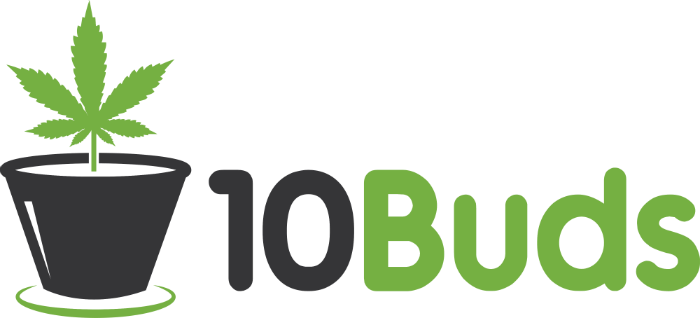
Well the big question is, does calamus smell nice? Because it states very obviously that the “kaneh bosm” has an aroma that is pleasing to the lord.
So I have a question as neither a smoker nor a Christian. Is it possible the Hebrew phrase is referring to hemp and not MJ? I do take CBD and can attest there’s a world of difference in the effects. And wasn’t modern MJ bred to have a much higher THC concentration than the garden variety plant?
I like the smell of marijuana when it’s green but do t care for the smell when it’s burning … so possible the sweet smell to God would mean, I’m the green form and not smoked ?? ? Just my opinion
unfortunately the dearly beloved Bible is exceedingly vague on just about every issue we want to thoroughly understand
Just as they said not to be in a braided over wine the same has to do with cannabis. Enjoy the fruits of what you are given but do not become infatuated or consumed by that certain material
Calamus and cannibis is not the same plant and they don,t even look the same much less smell the same.
my understanding is that the word in the bible is ‘kanabos’ which is not the same as marijuana. please tell me your understanding of the meaning of kanabos.
i agree with the comments below that CBD is much different than THC (Marijuana) and suspect that kanabos is CBD.
I’m a licensed minister and know that Bible pretty good. I happen to have Epilepsy. I take two medication’s for it proscribed by a Doctor called Depicote and Kepra. However along with those two I also use majuna and that is the main ingredient
Bullshit. Words in the bible have been taken out of context to refer cannabis. Scholars of the bible say this is absolutely false. Proponents of marijuana and legalization say just the opposite. Anyone with common sense knows that anyone who favors the legalization of marijuana will use whatever biblical justification they can find to support their argument, even if the supporting argument is taken far out of context and significantly disputed by biblical scholars. Cannabis IS NOT mentioned in the Bible. That is the only ration conclusion to be reached by critical thinkers who review all the facts. All that… Read more »